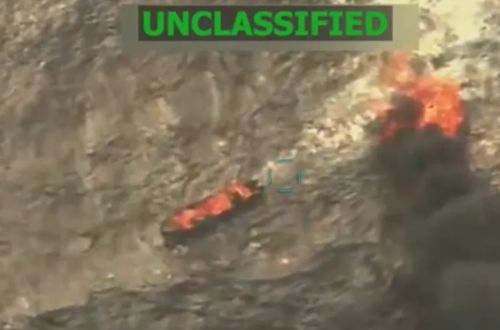

The United States has spent decades confronting drug trafficking with force, yet the record across Latin America shows that these efforts rarely achieve lasting results.

By Matthew A. McIntosh
Public Historian
Brewminate
Introduction
In the first year of the second Trump administration, the United States appears to be entering a new phase in its long-running campaign against narcotics trafficking: one defined not by arrests and interdictions but by military strikes and what officials refer to as “war.” The administration’s strategy of authorizing lethal force against suspected cartel vessels in international waters, notably off the coast of Venezuela, has been described by one outlet as “more missiles, fewer arrests,” signaling a shift away from law enforcement toward a full-blown combat posture.
The implications are profound. The shift raises urgent questions about the legal foundations of these actions, the effectiveness of treating organized crime as an insurgent adversary, and the broader consequences for U.S. strategy in Latin America. Critics warn that this isn’t just a replay of the failed “war on drugs” but an intensified version, operating in a far more volatile geopolitical environment, one where alliances, sovereignty and international norms are being challenged.
Adding to the concern is the administration’s push to bypass Congress: a resolution intended to curtail presidential authority over these strikes recently failed in the Senate, suggesting the legislature is allowing expansive military operations aimed at cartels to proceed without the usual oversight.
As the U.S. military deploys warships, intelligence assets and special operations forces to the Caribbean and eastern Pacific, the stakes have never been higher, and the lessons from decades of anti-drug efforts are being deeply ignored. This article examines the current escalation, its historical context, the legal and strategic risks involved, and why many analysts believe it is destined to follow the same cycle of failure.
Background: What Trump Ordered
The Trump administration has framed its new strategy as a direct military campaign against cartels, using force traditionally reserved for wartime. U.S. forces carried out strikes on suspected cartel-linked vessels in the Caribbean and off the coast of Venezuela, destroying boats believed to be part of trafficking networks. These operations have been paired with an expanded naval presence, including warships positioned for rapid engagement in maritime corridors long used by organized criminal groups.
Alongside maritime operations, the administration has embraced rhetoric that casts cartels as military enemies rather than criminal organizations. This narrative shift has laid the groundwork for policies such as potential cross-border action in Mexico, including the possible deployment of U.S. troops to confront cartel groups directly. Trump has continued to consider or endorse plans for military involvement inside Mexico, supported by allies who argue that cartels should be treated as hostile actors.
These moves have been accompanied by persistent calls from administration officials to expand executive authority in order to engage cartels with greater force, often without the need for additional congressional oversight. The combined maritime strikes, military planning, and shifting political rhetoric represent a sharp escalation that places national counter-drug operations in a space closer to open conflict than at any point in the modern era.
Legal and Constitutional Concerns
Trump’s expansion of military operations against cartel targets has raised significant questions about the legal basis for using force outside of traditional wartime settings. Analysts warn that framing cartels as military adversaries blurs the line between criminal enforcement and armed conflict, placing U.S. actions in a gray area of international law. Their assessment emphasizes that cartels are non-state criminal actors, not recognized combatants, and treating them as legitimate military targets risks undermining established norms that limit when and how force can be used.
Concerns are also emerging about the domestic constitutional basis for these operations. Congress recently failed to advance a resolution seeking to restrict President Trump’s authority over these strikes, effectively leaving broad executive war powers unchallenged. The defeat of that measure means the administration can continue to authorize maritime strikes and potential future escalations without new legislative approval. This absence of congressional oversight has triggered debate about whether the War Powers Act is being properly applied, and whether the administration is exceeding the boundaries of counter-narcotics authority.
International law specialists also note that unilateral U.S. military actions near Venezuela and Mexico risk violating sovereignty if undertaken without the consent of those states. These operations can be interpreted as unauthorized uses of force under the United Nations Charter, especially when they extend beyond interdiction into targeted strikes. That uncertainty could invite diplomatic fallout or legal challenges from affected governments, which historically have resisted foreign military involvement in their jurisdictions.
Additionally, MSNBC reporting shows that Trump has continued to entertain the possibility of sending U.S. troops into Mexico to pursue cartel groups. Such an action would represent a dramatic legal escalation, one that would require either host-nation approval or explicit congressional authorization to avoid breaching the constitutional separation of powers. The current strategy, combining maritime strikes with the prospect of expanded cross-border operations, has therefore intensified scrutiny from legal scholars who argue that the administration is attempting to redefine military authority in ways that challenge both domestic law and long-standing international principles.
Historical Precedent: The Old Drug War and Its Failures
Decades of militarized anti-drug operations in Latin America show a consistent pattern: despite enormous financial and military investment, trafficking routes adapt, violence intensifies, and cartels evolve faster than governments can counter them. The long “war on drugs” across the region produced few lasting gains, even during periods of heavy U.S. involvement in Colombia, Mexico, and Central America. Instead, the record shows that traffickers tend to shift routes, reorganize leadership, and exploit new markets, leaving governments with temporary disruptions rather than sustainable victories.
Mexico’s experience over the past two decades illustrates these limits most clearly. Militarized crackdowns beginning in the mid-2000s splintered major cartels into smaller, more violent groups, increasing instability in many regions. The fragmentation of trafficking networks often produced power vacuums that intensified local conflict rather than reducing it. These dynamics show how applying military pressure without institutional reforms or economic alternatives tends to destabilize communities while failing to dismantle the broader drug economy.
Organizations that study the region, including the Washington Office on Latin America (WOLA), argue that these failures stem from an overreliance on force and a neglect of governance and public-health strategies. In its analysis of Trump’s current anti-cartel plan, WOLA outlines five reasons militarized operations routinely fall short: they can increase violence against civilians, cartels rapidly adapt to enforcement pressure, corruption undermines state responses, cross-border conflict strains diplomatic ties, and militarization does not address the economic factors that sustain trafficking networks. Each of these factors has contributed to previous breakdowns in regional drug-control efforts.
The broader geopolitical context reinforces why past strategies failed. Many Latin American governments now view large-scale U.S. military involvement with skepticism, shaped by decades of interventions that left mixed results and long-term social consequences. This caution has grown as countries pursue their own security doctrines and resist external pressure for militarized approaches. Against this backdrop, new U.S. escalations risk repeating the same cycle of strained partnerships and inconsistent cooperation.
Experts warn that the narrative framing cartels as military enemies increases the likelihood of repeating historical mistakes. Treating criminal networks as insurgent forces can justify heightened conflict without addressing underlying drivers like corruption, poverty, demand for narcotics, or arms trafficking. Oversimplifying cartels as battlefield opponents risks locking the United States into another prolonged campaign whose results mirror earlier failures: high costs, rising instability, and little change in the availability of illicit drugs.
Strategic and Geopolitical Consequences
The escalation of U.S. military force against cartel networks is already raising alarm among regional analysts who warn that portraying cartels as battlefield opponents can reshape geopolitics in destabilizing ways. This narrative risks expanding conflicts beyond law-enforcement objectives by encouraging policies designed for state adversaries rather than criminal organizations. Their analysis stresses that militarizing anti-drug operations can entangle the United States in protracted confrontations that ignore political, economic and social conditions driving the drug trade.
These concerns extend to U.S. relations with Mexico and other Latin American partners. Past U.S. security campaigns often strained diplomatic relationships, particularly when Washington acted without strong coordination or when operations caused unintended harm. Governments in the region have increasingly resisted large-scale foreign military involvement, citing sovereignty and the mixed legacy of past interventions. Any new escalation, especially if it moves toward cross-border action, could complicate cooperation on issues ranging from intelligence sharing to immigration and economic policy.
Operational risks also shape the strategic landscape. WOLA’s assessment warns that military pressure can fragment cartels, creating smaller groups that may be more unpredictable and violent. Their analysis highlights how similar dynamics in Mexico and Central America produced localized conflicts, civilian casualties, and expanded criminal markets rather than weakening major trafficking networks. WOLA concludes that without institutional reforms and stronger governance structures, military force tends to shift violence rather than reduce it, making long-term stability harder to achieve.
The combination of high military engagement, diplomatic friction and the potential for escalating violence underscores why experts caution against the current trajectory. The United States risks committing to a campaign that offers few strategic gains while magnifying regional instability. When merged with the administration’s broader rhetoric about treating cartels as terrorist-like entities, the geopolitical environment becomes even more volatile, limiting opportunities for cooperation and increasing the likelihood of unintended conflict.
Expert Warnings About the Current Escalation
Analysts across the region argue that the Trump administration’s strategy mirrors patterns that have repeatedly failed to weaken drug trafficking networks. WOLA identifies five drivers of failure in past militarized campaigns: violence against civilians increases when criminal groups are targeted with force, cartels adapt their operations more rapidly than governments can respond, corruption obstructs enforcement, cross-border conflict harms diplomatic relationships, and military pressure does not address the economic conditions that sustain illicit markets. Their assessment warns that the current escalation shows many of these same features, suggesting that the United States is on course to repeat familiar mistakes.
Strategists caution that the geopolitical environment is more complex than during earlier phases of the drug war. They note that Latin American governments are increasingly reluctant to support foreign military operations and have adopted more diversified security strategies that do not rely on U.S. intervention. As a result, new unilateral actions by Washington could weaken regional cooperation on intelligence and enforcement, limiting the effectiveness of any campaign that depends on cross-border coordination.
Treating cartels as insurgent forces can provoke escalation cycles that extend the conflict rather than resolve it. They argue that this narrative shift risks legitimizing broader use of force without addressing the social, political and institutional factors that allow cartels to operate. By drawing the United States into a conflict structure more suited to state adversaries, experts warn that the administration could commit itself to a long-term campaign that delivers little strategic return.
The administration has continued to consider deploying U.S. troops into Mexico, an action that would represent a major escalation with uncertain outcomes. Such a move could intensify legal, diplomatic and security risks, especially if undertaken without strong bilateral support. The prospect of direct U.S. involvement on Mexican soil has been raised by allies of the administration who see the use of military force as necessary, even as experts caution that it could undermine regional stability and produce long-term complications.
Conclusion: A Familiar Cycle With Higher Stakes
The United States has spent decades confronting drug trafficking with force, yet the record across Latin America shows that these efforts rarely achieve lasting results. Analysts warn that the current escalation under President Trump follows many of the same patterns that defined past failures, from treating criminal networks as military adversaries to relying on strategies that increase instability without addressing the conditions that sustain the drug trade. Each assessment points to a common theme: militarization produces short-term disruption but long-term volatility.
What makes the present moment more consequential is the scale and character of the operations now underway. Maritime strikes, expanded deployments and the possibility of troop involvement in Mexico place U.S. policy in territory that approaches open conflict. Reporting from outlets such as Axios and MSNBC shows that these moves are occurring with minimal congressional oversight and amid rising concerns about sovereignty and international law. In this environment, even limited engagements risk triggering political or diplomatic complications that extend far beyond counter-narcotics objectives.
As the administration continues to justify the campaign through political narratives that cast cartels as wartime enemies, experts caution that the approach may amplify the region’s instability while offering few measurable gains. The lessons from previous anti-drug efforts suggest that force alone cannot resolve the underlying drivers of trafficking or weaken the networks that profit from it. Without a shift toward strategies that address governance, economic conditions and public health, the United States risks repeating a familiar cycle, one now unfolding at a moment when the regional and geopolitical stakes are significantly higher.
Originally published by Brewminate, 11.14.2025, under the terms of a Creative Commons Attribution-NonCommercial-NoDerivatives 4.0 International license.


